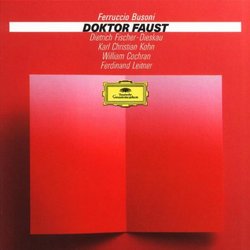| All Artists: Busoni, Fischer Dieskau Title: Doctor Faust Members Wishing: 0 Total Copies: 0 Label: Deutsche Grammophone/Polydor Release Date: 7/21/1989 Album Type: Box set Genre: Classical Style: Opera & Classical Vocal Number of Discs: 3 SwapaCD Credits: 3 UPCs: 2605000023226, 028942741324 |
Search - Busoni, Fischer Dieskau :: Doctor Faust
CD Details |
CD ReviewsFrom Octavio Roca's review from the Washington Times Record Collector | Mons, Belgium | 08/22/2006 (5 out of 5 stars) "Ferruccio Busoni's "Doktor Faust" is one of the great operas of our century. Created in 1923, the same year as Berg's "Wozzeck," it has been unjustly neglected in this country even as inferior and less satisfying works are routinely exhumed for public viewing.
A contemporary of Debussy, Mahler and Puccini as well as Berg, Busoni was one of the most conservative composers of his generation. His aim in music was not "to overthrow but to re-create something which already exists." Near the end of his life, he took an existing myth--already transformed into art by Marlowe and Goethe--and created an original, profoundly beautiful masterpiece. Marlowe's play "Dr. Faustus" made its way to Germany through the hands of puppeteers, and it is on one of these puppet adaptations that the opera is based. In a spoken prologue (omitted in this recording) the Poet announces that "In childhood's far-off day/I watched enthralled a play/in which the Devil took a part . . ./Such plays of unreality require the help of music/for she stands remote from all that's common,/she can wake desire that's bodiless,/in air her voices float." As the curtain rises, he reminds us that "though I seek to tell the tale anew,/its puppet parentage is plain to view." The story is simple, its intellectual echoes at least as profound as those of Goethe's romantic play. There are no love scenes in the opera, which may have doomed it on the stage; instead, the intellectual anguish of the quest for knowledge is exposed almost bare. Above all, the music is stark and beautiful. Equally fascinated by Bach and Liszt, Busoni constantly creates a counterpoint with impossibly beautiful bits of melody, weaving them in and out of a seamless tonal fabric that is never less than fascinating. The vocal declamations, though far from Wagnerian, carry the use of leading motifs to a fusion of word and music. The feeling is austere, surprisingly moving, highly dramatic. The version that was recorded in 1970 is satisfying on its own terms. Dietrich Fischer-Dieskau's Faust is intense, feverish and almost as demonic as the Devil himself. The velvet of his middle voice deceptively caresses lines that suddenly explode in an orgy of desperate excitement. I can think of no other baritone who could illuminate so many corners of this character's dark psyche in such a magnificent voice. William Cochran's Mephistopheles is not beautifully sung: His high voice might get on one's nerves were it not for the intelligence behind the interpretation. The smaller roles are cast from strength. Hildegard Hillebrecht's voice by 1970 was headed toward vocal disasters along the lines of Gwynneth Jones, but she too manages to husband her resources well and bring authority to the role of the Duchess of Parma. Moments of magic abound under Ferdinand Leitner's direction: the opening vision, the students' serenade, the offstage choruses and more. In the Tavern Scene, a contrapuntal battle between the Gregorian Te Deum and the Lutheran hymn "Ein' feste Burg" is dazzling in its musical invention and in the sense of space conveyed in the recording. The digital remastering is excellent. " |

